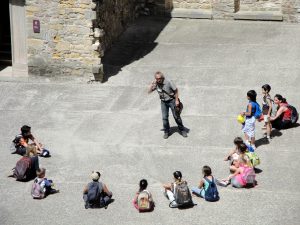
When you were you young, do you remember pretending to be on adventures with your teachers? Have you tried playing roles with your classmates? If yes, then you are lucky you have experienced drama plays in your preschool. In this article, we are going to tell you about the benefits of dramatic plays and the reasons why you should let your children experience the joy of drama. You would learn a lot in this article whether you are a teacher or a parent. For parents who are interested in sending your children to specialized speech and drama classes, or holiday programmes, head over to www.juliagabriel.com to find out more!
To begin, Sarah Punkoney will tell us about the incredible benefits of dramatic play.
THE INCREDIBLE BENEFITS OF DRAMATIC PLAY
WHAT IS DRAMATIC PLAY?
Dramatic play is s a type of play where children assign and accept roles and act them out. It’s pretending to be someone or something else. Someone different and new like a supervillain, or someone well known and familiar like mom. Sometimes children take on real-world roles, other times they take on fantasy roles. Either way, it is play that involves breaking down the barriers of reality and results in serious and natural learning.
EXAMPLES OF DRAMATIC PLAY
- a child who pretends to feed and rock a doll to sleep
- a child who pretends to fix a leaky faucet in the play kitchen
- a child who pretends to be Spot the dog and plays fetch
- a child who stirs counting bears in a bowl to make bear soup Read more here.
We should really encourage our students to have dramatic plays as much as we can. For parents, dramatic plays could also be done at home any time. That is why if we have the time, then we should also have dramatic plays with our children. Now, Bright Young Things Drama School will give us more of the benefits of drama.
Benefits of Drama
Increasingly the power of drama is being recognised as one of the most effective ways to develop soft skills and emotional intelligence in children and young people, skills that are often not developed through the traditional education system. Drama promotes communication skills, teamwork, dialogue, negotiation, socialization. It stimulates the imagination and creativity; it develops a better understanding of human behaviour and empathy with situations that might seem distant. It allows the development of a critical thinking and allows us to make better and more conscious decisions; it encourages us to use our bodies and our voices, it encourages and inspires us to say “no”, to stand for, to speak up.
Every day at Bright Young Things we witness first-hand the benefits of drama for children and have had the pleasure to see our byts blossom and unlock their full potential, which has a significant impact on all aspects of their life. Read more here.
One of the benefits given above is that it encourages team work and cooperation. Since they will be working with groups of children, they will be trained to work with different kinds of people. They will be trained to solve problems in groups and that would be helpful for their future. Next up, David Farmer will tell us why we should teach drama to primary school children.
Why Teach Drama to Primary School Children?
Dramatic activity is already a natural part of most children’s lives before they start school in the form of make-believe play, enabling them to make sense of their own identity by exploring meaningful fictional situations that have parallels in the real world. This can be utilised at school through structured play and drama to encourage pupils to learn actively and interactively throughout the primary years and across the curriculum.
Children like to move and to interact with others. In drama we ask them to do exactly this. Rather than sitting still and listening they are encouraged to move, speak and respond to one another. Students who are challenged by reading and writing (including those with English as a second language) often respond more positively to the imaginative and multisensory learning offered by drama. This in turn helps them develop such skills as creativity, enquiry, communication, empathy, self-confidence, cooperation, leadership and negotiation. Most importantly, drama activities are fun – making learning both enjoyable and memorable. Read more here.
According to the article, drama gives children opportunities to explore, discuss and deal with difficult issues and to express their emotions in a supportive environment. So as early as primary or preschool school, they would already be trained in dealing and solving several problems or conflicts. So then it proves that drama plays in early childhood can be a training ground which can help them with their future lives.